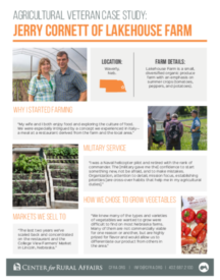Farm details: Lakehouse Farm is a small, diversified organic produce farm with an emphasis on summer crops (tomatoes, peppers, and potatoes).
Location: Waverly, Nebraska
Why I started farming
“My wife and I both enjoy food and exploring the culture of food. We were especially intrigued by a concept we experienced in Italy—a meal at a restaurant derived from the farm and the local area.”
Military service
“I was a Naval helicopter pilot and retired with the rank of commander. The [military gave me the] confidence to start something new, not be afraid, and to make mistakes. Organization, attention to detail, mission focus, establishing priorities [are cross-over habits that help me in my agricultural duties].”
How we chose to grow vegetables
“We knew many of the types and varieties of vegetables we wanted to grow were difficult to find on most Nebraska farms. Many of them are not commercially viable for one reason or another, but are highly prized for flavor and would allow us to differentiate our product from others in the area.”
Markets we sell to
“The last two years we’ve scaled back and concentrated on the restaurant and the College View Farmers’ Market in Lincoln, Nebraska.”
How we market our products
“Word of mouth has been the best marketing and I’m a big proponent of the ‘big pile’ at the farmers’ markets.”
In the beginning
“I attended conferences and seminars whenever I could, and asked a lot of questions.”
Barriers to overcome
“Labor barriers have been a real challenge; this isn’t the type of work that many in the area seek out (both farm and restaurant).”
Our neighbors
“We have a conventional row crop farmer around our property perimeter. He’s been a great neighbor; we trade tomatoes for sweet corn!”
Advice for others
Question: What do you wish you had known before starting to farm? What would you say to your earlier self when you were starting out?
Answer: “Will this be a second income or primary income?”
Question: Do you have any advice for anyone who is considering farming as an occupation?
Answer: “Have a fallback; a second job is a must. Especially with produce, it is extremely difficult to make a living on just farming.”
This case study is funded through the National Institute of Food and Agriculture (NIFA), through the U.S. Department of Agriculture award #2020-77028-32890. The Center for Rural Affairs is an equal opportunity provider and employer.


